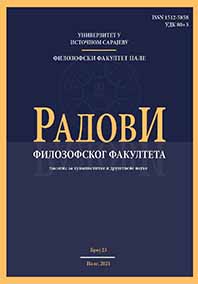ПОИМАЊЕ ПРИРОДНОГ СТАЊА И ПРВОБИТНОГ ЧОВЈЕКА У ФИЛОЗОФИЈИ ТОМАСА ХОБСА И ЖАН-ЖАК РУСОА
UNDERSTANDING THE STATE OF NATURE AND PRIMORDIAL MAN IN THE PHILOSOPHY OF HOBBES AND ROUSSEAU
Author(s): Ognjen R. KandićSubject(s): Philosophy, Political Philosophy, Social Philosophy, Early Modern Philosophy
Published by: Универзитет у Источном Сарајеву, Филозофски факултет Пале
Keywords: man; nature; law of nature; mercy; society; Hobbes; Rousseau;
Summary/Abstract: Although man as a central problem in philosophy reached its peak only in the 20th century, we give the answer to the question that permeates not only scientific discussions, but also everyday life of all people – What is man? – throughout the history of mankind. Nevertheless, with all the strong definitions of man as a social, spiritual, political being, rational or hard-working animal, etc., which are, as a rule, too broad or too short, it still remains open and ambiguous. As we were able to see, the question of man is the basis of the philosophy of Hobbes and Rousseau; therefore they approached the solution of this essential anthropological problem with the same enthusiasm as their contemporaries, but from entirely different thinking perspectives. Hobbes essentially sees man as a selfish, self-obsessed and aggressive egoist who is in a natural state of war against all others. It is for these traits, for his self-centred concern and interest in his own life and safety, that he eventually agrees to seek the possibility of establishing peace and becomes part of an organized society called the State. In this regard, humans, as impulsive and sensitive but yet mindful beings, in fact, only obey the “dictates of enlightened egoism” which Hobbes identifies with the laws of nature. On the other hand, Rousseau’s natural state is practically described as war of all against all. Neither moral nor sentimental connection, nor a thought of duty or any feeling, is what unites individuals here. Everyone exists solely for himself and seeks only as much as necessary to keep themselves alive. Needs, greed, oppression, desires, and all those arrogances that Hobbes ascribes to the natural state, according to Rousseau, are concepts taken from the existing society. As stated by Rousseau, when speaking of a savage Hobbes describes an educated man. The drive to rob and violently dominate is uncommon to a natural man as such. Therefore, the determining moment of the natural man is by no means the violent oppression of others, but the indifference towards them and the drive to be distinguished and separated from them. According to Rousseau, the man is a much weaker being than an animal, but therefore much better established, mostly due to the ability to improve of improvement. This concept allows him to create the history of man as a species. Improvement develops all other qualities of a man: openness, curiosity, a desire for change, etc. Thus we can see that while human nature according to Hobbes remains the same after the transition to the civil state, according to Rousseau, the human species is able to change its nature by adapting to new conditions, which is the basic conclusion of this work.
Journal: Радови Филозофског факултета (часопис за хуманистичке и друштвене науке)
- Issue Year: 2021
- Issue No: 23
- Page Range: 141-156
- Page Count: 16
- Language: Serbian

